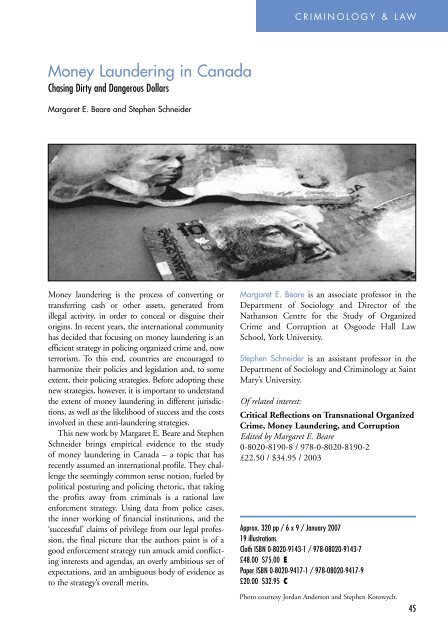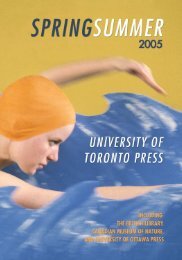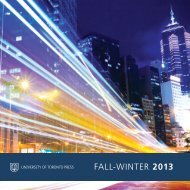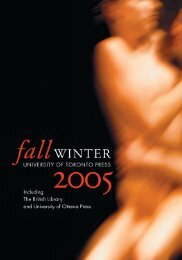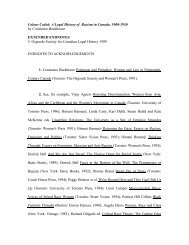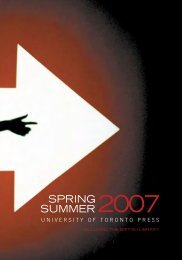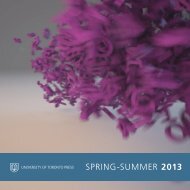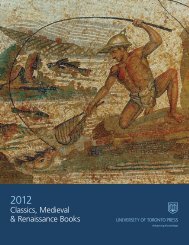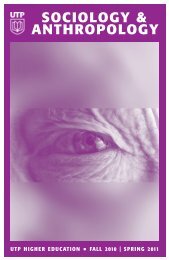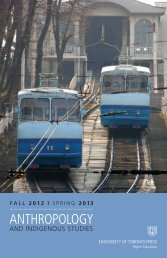Fall/Winter 2006 - University of Toronto Press Publishing
Fall/Winter 2006 - University of Toronto Press Publishing
Fall/Winter 2006 - University of Toronto Press Publishing
You also want an ePaper? Increase the reach of your titles
YUMPU automatically turns print PDFs into web optimized ePapers that Google loves.
C R IG ME I NEO RLA OL GI Y N T& E RL EAW<br />
S T<br />
Money Laundering in Canada<br />
Chasing Dirty and Dangerous Dollars<br />
Margaret E. Beare and Stephen Schneider<br />
Money laundering is the process <strong>of</strong> converting or<br />
transferring cash or other assets, generated from<br />
illegal activity, in order to conceal or disguise their<br />
origins. In recent years, the international community<br />
has decided that focusing on money laundering is an<br />
efficient strategy in policing organized crime and, now<br />
terrorism. To this end, countries are encouraged to<br />
harmonize their policies and legislation and, to some<br />
extent, their policing strategies. Before adopting these<br />
new strategies, however, it is important to understand<br />
the extent <strong>of</strong> money laundering in different jurisdictions,<br />
as well as the likelihood <strong>of</strong> success and the costs<br />
involved in these anti-laundering strategies.<br />
This new work by Margaret E. Beare and Stephen<br />
Schneider brings empirical evidence to the study<br />
<strong>of</strong> money laundering in Canada – a topic that has<br />
recently assumed an international pr<strong>of</strong>ile. They challenge<br />
the seemingly common sense notion, fueled by<br />
political posturing and policing rhetoric, that taking<br />
the pr<strong>of</strong>its away from criminals is a rational law<br />
enforcment strategy. Using data from police cases,<br />
the inner working <strong>of</strong> financial institutions, and the<br />
‘successful’ claims <strong>of</strong> privilege from our legal pr<strong>of</strong>ession,<br />
the final picture that the authors paint is <strong>of</strong> a<br />
good enforcement strategy run amuck amid conflicting<br />
interests and agendas, an overly ambitious set <strong>of</strong><br />
expectations, and an ambiguous body <strong>of</strong> evidence as<br />
to the strategy’s overall merits.<br />
Margaret E. Beare is an associate pr<strong>of</strong>essor in the<br />
Department <strong>of</strong> Sociology and Director <strong>of</strong> the<br />
Nathanson Centre for the Study <strong>of</strong> Organized<br />
Crime and Corruption at Osgoode Hall Law<br />
School, York <strong>University</strong>.<br />
Stephen Schneider is an assistant pr<strong>of</strong>essor in the<br />
Department <strong>of</strong> Sociology and Criminology at Saint<br />
Mary’s <strong>University</strong>.<br />
Of related interest:<br />
Critical Reflections on Transnational Organized<br />
Crime, Money Laundering, and Corruption<br />
Edited by Margaret E. Beare<br />
0-8020-8190-8 / 978-0-8020-8190-2<br />
£22.50 / $34.95 / 2003<br />
Approx. 320 pp / 6 x 9 / January 2007<br />
19 illustrations<br />
Cloth ISBN 0-8020-9143-1 / 978-08020-9143-7<br />
£48.00 $75.00 E<br />
Paper ISBN 0-8020-9417-1 / 978-08020-9417-9<br />
£20.00 $32.95 C<br />
Photo courtesy Jordan Anderson and Stephen Kotowych.<br />
45


